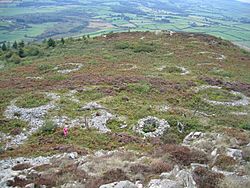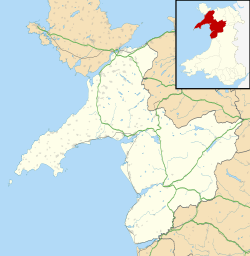Garn Boduan facts for kids
Quick facts for kids Garn Boduan |
|
|---|---|
| Highest point | |
| Elevation | 279 m (915 ft) |
| Prominence | 172 m (564 ft) |
| Listing | Marilyn |
| Geography | |
| Location | Llŷn Peninsula, Wales |
| Parent range | Snowdonia and Llyn Peninsula |
| Garn Boduan | |
|---|---|
| Gwynedd, Wales, UK | |

Stone hut circles on Garn Boduan
|
|
|
Location in Wales Gwynedd
|
|
| Coordinates | 52°55′29″N 4°30′51″W / 52.9247°N 4.5141°W |
Garn Boduan is a special hill in Wales, located on the Llŷn Peninsula near Nefyn. It's not just any hill; it's also the site of an ancient hillfort from the Iron Age. This means it was once a strong, protected settlement where people lived a very long time ago.
What is Garn Boduan?
Garn Boduan is a hill that stands about 279 meters (915 feet) tall. It offers amazing views of the surrounding area. But its most exciting feature is the remains of an ancient settlement. This settlement was built by people living in the Iron Age, a period in history when people started using iron tools and weapons.
Life in an Iron Age Hillfort
Imagine living in a village on top of a hill! That's what a hillfort was. It was a fortified village, usually built on high ground for protection. People lived inside strong walls, which helped keep them safe from enemies.
Homes on the Hill
Archaeologists have found traces of over 170 round houses at Garn Boduan. These were circular homes where families lived. Even today, you can still see the outlines of about 100 of these ancient houses on the ground. Experts believe that between 100 and 400 people might have lived in this hillfort at one time.
Strong Defenses
To protect themselves, the people of Garn Boduan built strong walls, called ramparts. The lowest stone rampart you can see today was the very first defense. It was built during the Iron Age to keep the community safe.
Later, around the 6th or 7th century AD, another, smaller rampart was added. This one was built on the eastern side of the hill. These layers of defenses show how important protection was to the people who lived there.
 | Leon Lynch |
 | Milton P. Webster |
 | Ferdinand Smith |


